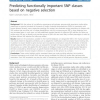Free Online Productivity Tools
i2Speak
i2Symbol
i2OCR
iTex2Img
iWeb2Print
iWeb2Shot
i2Type
iPdf2Split
iPdf2Merge
i2Bopomofo
i2Arabic
i2Style
i2Image
i2PDF
iLatex2Rtf
Sci2ools
154
click to vote
BMCBI
2011
2011
Predicting functionally important SNP classes based on negative selection
Background: With the advent of cost-effective genotyping technologies, genome-wide association studies allow researchers to examine hundreds of thousands of single nucleotide polymorphisms (SNPs) for association with human disease. Recently, many researchers applying this strategy have detected strong associations to disease with SNP markers that are either not in linkage disequilibrium with any nonsynonymous SNP or large distances from any annotated gene. In such cases, no well-established standard practice for effective SNP selection for follow-up studies exists. We aim to identify and prioritize groups of SNPs that are more likely to affect phenotypes in order to facilitate efficient SNP selection for follow-up studies. Results: Based on the annotations available in the Ensembl database, we categorized SNPs in the human genome into classes related to regulatory attributes, such as epigenetic modifications and transcription factor binding sites, in addition to classes related to gen...
Related Content
| Added | 12 May 2011 |
| Updated | 12 May 2011 |
| Type | Journal |
| Year | 2011 |
| Where | BMCBI |
| Authors | Mark A. Levenstien, Robert J. Klein |
Comments (0)

